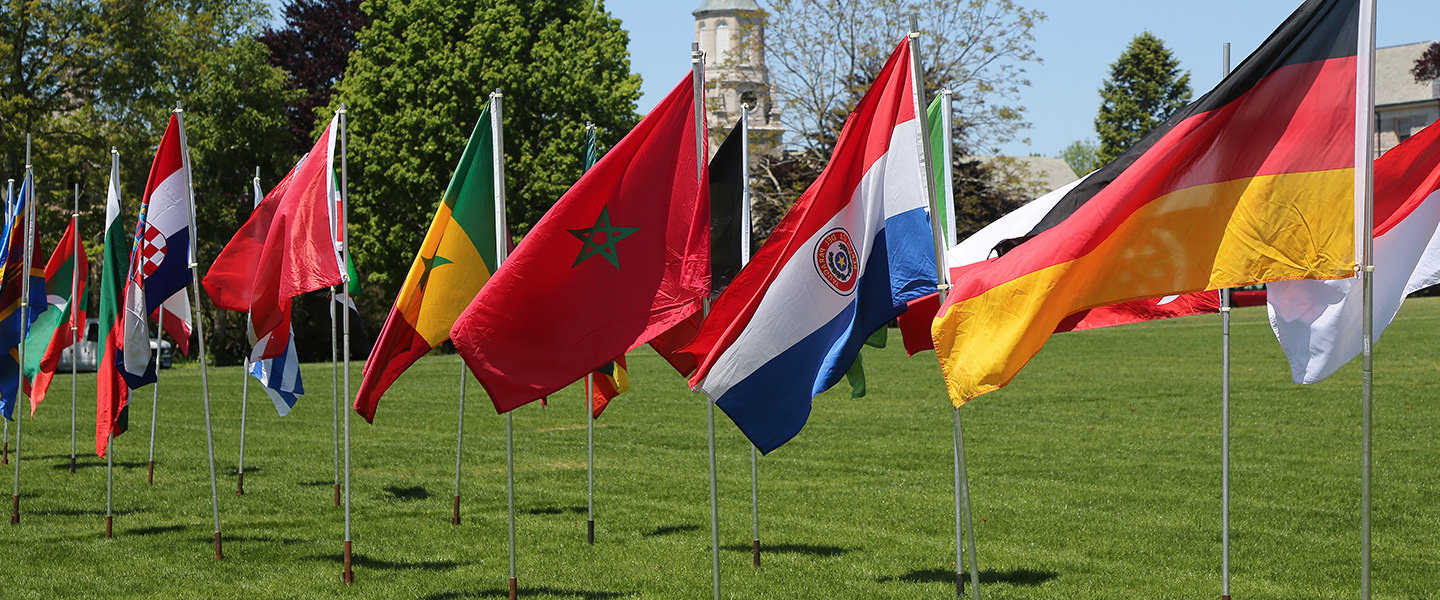Many strange things have been afoot at Conn in our Shain-less year, not the least of which has been the displacement of Knowlton Dining Hall to the 1973 room in Harris. However, in the wake of several open table discussions with students, staff and administrators, we can confirm that the Knowlton Dining Hall and its language-centered tables will be returning home in the Fall 2015 semester.
Knowlton Dining Hall, which doubled as the language dining hall and a space Knowlton residents have used to build community over the years, was relocated for the academic year amidst much resistance from Knowlton residents. This move, according to Ulysses Hammond, Vice President of the College, was catalyzed by the need to bring technology to South Campus for the year. Now, with the newly renovated library slated to open the week after Spring Break, the computer lab in Knowlton is ready to be packed up. The conversation around Knowlton’s future has began taking place in a series of discussions in Coffee Grounds where faculty, staff, residents and friends of the dining hall are voicing their opinions about the year off from Knowlton dining hall and its return.
Before meeting with administrators, I was under the impression that there was a conflict around the return of the dining hall. Students seem to suspect that the school was going to use the excuse to scrap the Knowlton dining hall as a cost-cutting measure. According to Danielle Palmieri ’15, the Housefellow of Knowlton dorm, such confusion was a result of the first Coffee Grounds event, where “since they promised that it would be put back in Knowlton when they took it out and the Knowlton residents protested, a lot of people who attended the event were confused about the point of [the event,] since it is supposed to go back anyway.”
It seems that these discussions were held simply to clarify whether Knowlton residents still wanted to have the dining hall in the dorm. Director of Dining Services, Ingrid Bushwack, spoke about the possible advantages of having the dining hall remain in the 1973 room by pointing out the ease of access for faculty who are unable to enter Knowlton without a Camel Card. Instructional Designer of the Language and Culture Center, Laura Little, also said that Harris made language tables more visible and “appealing to a wider spectrum of people on campus.” Fortunately, members of the administration were quick to clear the air by very resolutely declaring that the dining hall was to go back to Knowlton in Fall 2015, as promised.
However, despite good intentions on the part of the administrators and other departments, it is understandable that Knowlton residents and regulars have been wary of the desire to bring to question the future of the dining hall. The disruption in its absence has been considerable. Spanish learner, Nabeeh Asim ’17, commented, “I used to go there everyday.” He continued to say that this year wasn’t the same because professors didn’t go to Harris as regularly and because “random people sit there.”
Little explained this point: “Some students don’t honor the signs at the tables –– that is, they sit at them because they are free, with no intention of speaking any language but English. This disrupts the ‘language microcosm’ that the space is intended to be.”
Additionally, language learners have disliked the noise level of the 1973 room. “It’s hard enough for beginners to comprehend authentic speech,” concurred Little, “when you can’t hear well, it’s a real hindrance.” In addition to these concrete issues, the issue of “the Knowlton environment” has been significant. As Vice President Hammond rightly recognizes, “warmth, the coziness and the community of Knowlton is tough to compete with.”
In addition to disruptions to the language program, on the Knowlton community has also suffered. Alicia Perez ‘17, a two year Knowlton resident, said, “I used to know everyone in Knowlton but now I don’t know anybody.” Palmieri agreed that “the community has been impacted in a negative way.” As one of our traditionally close-knit residential communities, Knowlton has been hit hard by the absence of the dining hall.
For all these sacrifices, Vice President Hammond expressed his gratitude and appreciation for the Knowlton community and for the campus as a whole for their collaboration in the renovation of Shain library and mentioned that while the year has not been easy for anybody, he did not receive any complaints from anyone. However, it is important to keep in mind that while residents have had to consent to the absence of the dining hall for “the greater good,” as it were, the experience has been taxing both for the language program and for the residents of Knowlton, and is something that future projects should seek to avoid.
For now, college administrators look toward the silver lining. In this context, future meetings in Coffee Grounds will be “brainstorming sessions” looking for ways to bring the positives of the 1973 room back to the dining hall. Vice President Hammond expressed hope that people who have discovered and enjoyed sitting in the 1973 room will transition back to Knowlton, increasing the language traffic next year. One can also hope that having the language tables in the 1973 room will make it a little more “social” and that the room will continue to be used for group meetings and class lunches.
Bushwack mentioned plans to revamp the kitchen in the basement of Knowlton in the near future. This opens the door to the possibility of converting sections of Knowlton into an independent housing option with an international theme. These new ideas are all being considered to make sure that the dining hall and the language tables return stronger than before after their “year abroad,” as Little calls it. In the meantime, the language tables will have to be content with the remaining months of anti-sociality before heading home.•










